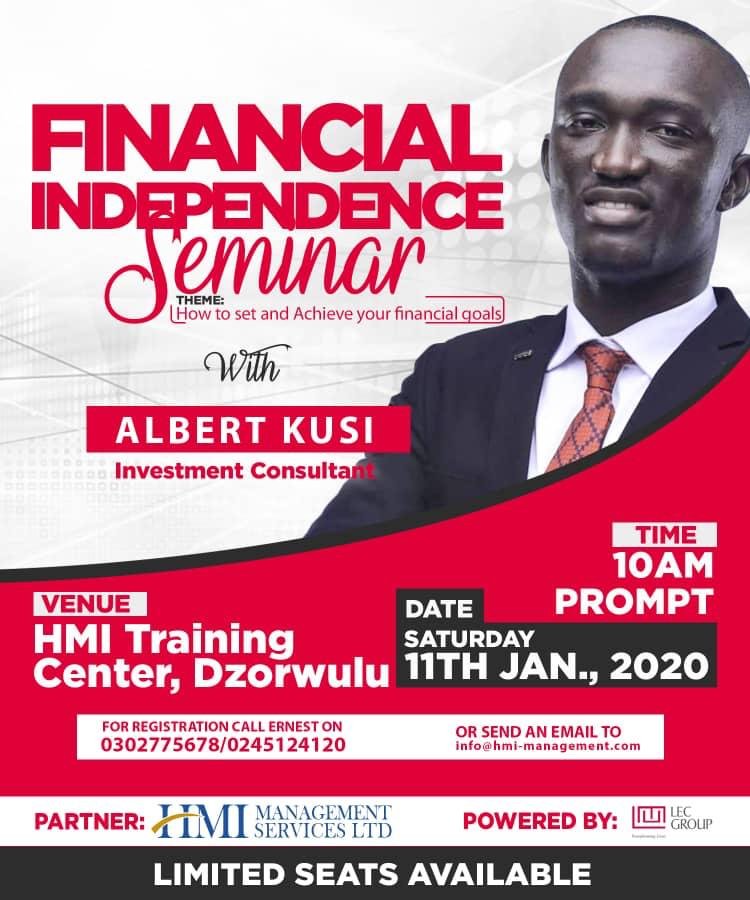What better way to begin a new decade than to educate yourself about financial Independence! As you may already know, aside time, money is one of the resources that you must manage wisely in order to attain some of your life goals. In line with this, about 20 people converged at the HMI Management Services Training Center to learn about how to set and achieve your financial goals on Saturday, 11th January, 2020.

Know your Present State
The session began with a word of prayer. Mr. Albert Kusi, an experienced investment consultant, began by saying the first step to financial independence is to assess you current situation. Here, he meant knowing your asset base and your net worth at present. In line with this, he said you have to know your net worth which is assets minus liabilities. Under knowing your assets, he made mention of investment, cars, clothing etc. He then continued by asking if clothing falls under assets. In response, a member of the audience said no but then another person said clothing can be considered as asset only if it can generate income for you. Mr. Kusi then said it’s very debatable as to whether clothing is an asset or not. He then continued to say all things you believe are yours (the things you own ) are your assets.

Liabilities are people and things you owe. He then continue to say that owings is not just about loans but can be borrowings and all other things you believe are not yours. He said if even you stay with your parents, it can be considered under liabilities in that the person who has rented his place might have a higher net worth than you. In essence, he said, liabilities are not just owings but all the things that are not yours. So your total assets less your total liabilities equals your net worth. He then gave a scenario by saying you have if you have GH¢1000 in your savings account, GH¢500 in investment, you have a laptop, a phone etc., it’s important to know all these these things fall under your assets. You need not to have all these things in liquid (cash) to become assets. Fixed assets plus current assets equal your total assets, less your liabilities gives you net worth.
Set SMART Financial Goals
In order to achieve financial independence, you need to assess your your asset base currently in order to set SMART goals. SMART, he said, is an abbreviation for Specific, Measurable, Attainable, Realistic and Timeable. In order to set SMART goals, your current situation needs to be assessed. For example, if you have GH¢500 in your account, how come you want to end the year with GH¢1m in your account, what are the things you need to put in place in order to achieve the stated goal.
The first step in setting and achieving financial goals is to assess your current situation. When you are able to do that, it gives you a fair idea as to how to set your goals. It’s important to set a goal but you need to be disciplined. He then continued by outlining what you must do to achieve your financial goals:
-
“You must not put all pressure on your job to achieve your financial goals; get multiple streams of income,” he said. It’s not your company’s responsibility to help you achieve your financial goals; you need to set your priorities right. “Be careful you are not under pressure when dealing with financial goals,” he cautioned. When dealing with financial goals, you must;
-
Avoid pressure
-
Live within your means; don’t spend more than you earn.
-
Avoid unnecessary spending. Desist from buying things you don’t really need. “Don’t change your lifestyle when your income changes,” he cautioned again. Here, he meant upward movement of salary. Plan for unforseen circumstances.
When dealing with setting and achieving financial goals, observe the following;
-
Assess your current situation which has early on been explained.
-
Set a financial target for yourself
-
Devise a plan for your target. Let your budget give you an idea of how to spend, pay attention to your spending.

Save & Invest Wisely
To talk of investment which is the next point, he cautioned the audience to know the difference between investment and savings. People keep so much money in their savings account instead of pushing it to an investment account.
-
Pay yourself. Here, consider ‘pay yourself’ as a replacement for the word investment. Don’t ignore family entirely when dealing with financial goals. He cautioned participants not to be greedy in their quest to earn money and achieve financial Independence in that people look for high risk investment with high benefits instead of low risk investment with moderate income or benefits. “Diversify your portfolio,” he said. Value mobile money because it can cause you to spend more than you have planned.
-
Learn to start small.
-
Get a financial advisor. Find out all your streams of income. He ended by saying participants can invest in collective investment schemes which include mutual funds and unit trust funds. There is less risk in doing this investment in that people pool resources together to do this investment.
The program ended with a closing prayer by a participant.
What a marvelous way to begin a decade.
This report was written by Gabriel Narh Tetteh, a level 100 Business Administration student of the Kwame Nkrumah University of Science and Technology (KNUST).